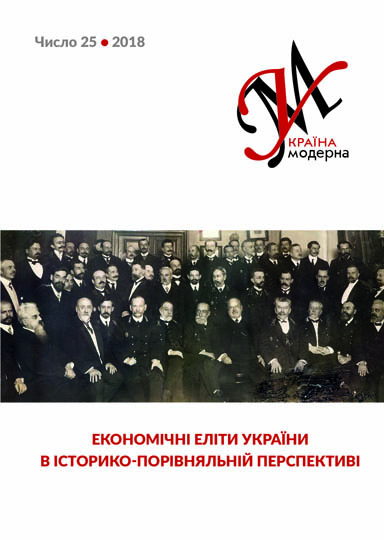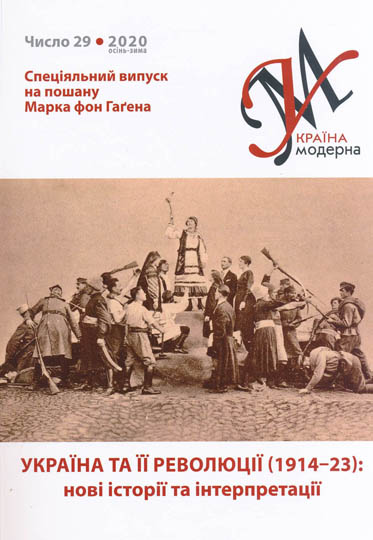Ukraina Moderna
Ukraina Moderna («Україна Модерна»). An interdisciplinary scholarly journal devoted to the history of Ukraine and Central and Eastern Europe from the late 18th through the 20th century. It is a publication of the Lviv-based Petro Jacyk Program for the Study of Modern Ukrainian History and Society of the Canadian Institute of Ukrainian Studies, University of Alberta. It has appeared since 1996 in Ukrainian and English; since 2007 in the format of thematic issues; and since 2019 twice a year. Its editors-in-chief have been Yaroslav Hrytsak and Mykola Krykun (1996–2007), Andrii Portnov (2007–10), Yuliia Kysla (2011–12), Yaroslav Hrytsak (2013), and Gelinada Grinchenko (2014–). Hrytsak continues to serve on the editorial board as the founding editor, and other members of the editorial team include Tania Plawuszczak-Stech, Maryna Kurushyna, Petro Dolhanov, and Marko Robert Stech. Since 2023 all issues are available on the online journal platform managed by the University of Toronto Press. The journal’s editorial office is officially located in the Institute of Historical Research at Lviv National University.
Since its inception, Ukraina Moderna has been a prime historical academic journal in Ukraine with a focus on the country’s modern history. It published both original research, often on little-studied topics, and historical sources (such as the unpublished universals and letters of Hetman Bohdan Khmelnytsky; the terms of the Polish-Ukrainian agreement of 1890; letters of Symon Petliura, Ivan Franko, Ivan Lysiak Rudnytsky, Roman Rozdolsky, Ivan Kedryn, and Yaroslav Stetsko; memoirs of Abram Hozenpud; and little known writings of Viktor Petrov and Roman Rozdolsky).
Since 2007 virtually every individual issue has featured a special thematic section dealing with such topics as the regional identities in contemporary Ukraine (vol. 11, 2007), the status of the humanities in Ukraine and Eastern Europe (vol. 12, 2007), the Second World War in Ukrainian historiography (vol. 13, 2008), Marxism and its intellectual legacy in Ukraine and Eastern Europe (vol. 14, 2009), historical memory, legacies, and politics of memory (vol. 15, 2009), language transformations and translation (vol. 16, 2010), the borderlands and frontiers (vol. 18, 2011), history teaching in secondary education (vol. 19, 2012), fascism and right-wing radicalism in Eastern Europe (vol. 20, 2013), the history of reading culture in Ukraine (vol. 22, 2015), the First World War and Ukraine (vol. 23, 2016), the history of Jews in Ukraine (vol. 24, 2017), economic and business elites in modern Ukraine (vol. 25, 2018), the history of philosophy in Ukraine (vol. 26, 2019), quantitative methods in linguistics (vol. 27, 2019), the murder of the mentally ill in Nazi-occupied Ukraine (vol. 28, 2020), the Ukrainian Revolution of 1917–20 (vol. 29, 2020), the Holodomor (vol. 30–31, 2021), the Ukrainian diaspora (vol. 32–33, 2022), and the Holocaust in Ukraine (vol. 34, 2023). Ukraina Moderna authors include leading historians and scholars from Ukraine and from around the globe.
Since April 2011 Ukraina Moderna has also operated a scholarly/discussion website supported by the Petro Jacyk Program for the Study of Modern Ukrainian History and Society of the Canadian Institute of Ukrainian Studies. It serves as a virtual forum for professional historians and for scholars representing other areas of the humanities and social sciences. It covers a number of topics and issues that lie at the intersection of scholarship and current affairs in Ukraine. Its chief editors have been Yuliia Kysla (April 2011–June 2013), Gelinada Grinchenko (July 2013–September 2014), Oksana Kis (October 2014–August 2020), and Oksana Ovsiiuk (September 2020–). Oksana Forostyna serves as editor of the section dedicated to the Russo-Ukrainian war. At various times a number of research associates supervised the work of different sections of the Ukraina Moderna website, among them Historians’ Biographies (Svitlana Odynets, Marta Havryshko, and Oleh Hrynchuk) and (De)Constructing Memory (Iryna Starovoit and Petro Dolhanov).
The website currently comprises five main departments or ‘rubrics’: ‘U vyri viiny’ (In the Vortex of War) contains research, notes, diaries, and interviews of those directly affected by the ongoing Russo-Ukrainian war; ‘Opiniї’ (Opinions) features historians’ reflections on the concepts of history and on recent events; ‘Pytannia istoriї’ (Historical Issues) deals with controversial issues of modern history; ‘Podolannia mynuloho’ (Overcoming the Past) is devoted to the processes of rethinking of and coming to terms with the tragic legacy of genocides that occurred on the territory of present-day Ukraine; and ‘Notatky’ (Notes) presents reviews and critical essays about major academic events, publications, and personalities. In addition, ‘Retsenzii’ (Reviews, managed by Illia Chedoluma) presents book reviews and ‘Oholoshennia’ (Announcements) features information about upcoming academic events, conferences, lectures, fellowships, and job opportunities in the field of history and related disciplines.
BIBLIOGRAPHY
Ukraina Moderna journal official website: https://www.utpjournals.press/loi/ukrainamoderna
Ukraina Moderna scholarly/discussion website: https://uamoderna.com/
Serhiy Bilenky
[This article was written in 2024.]


.jpg)